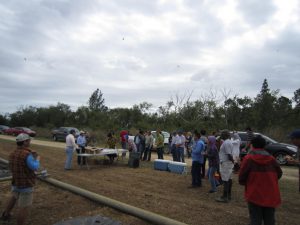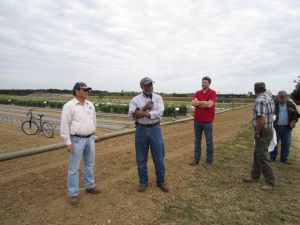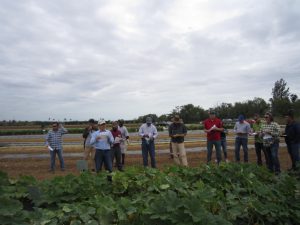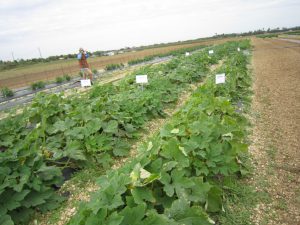Squash crown rot disease is the most common problem for growers. To help growers with pest management, scientists at the UF/IFAS Tropical Research and Education Center (TREC) set up field trials. Field day for vegetable growers is an effective approach to showcase farming practices in pest management. Integrated Pest Management (IPM) plays a critical role in vegetable production. To implement IPM, a demonstration with field trials is an effective approach. We are planning to organize a series of field days to showcase various practices of pest management in vegetable fields with different trials.

Who participated
The first field day in 2018 had total of 45 participants. They are growers, industry representatives, UF/IFAS faculty, staff, visiting scholars, and graduate students.
Syngenta provided a sponsorship for lunch, and 21 State certified pesticide applicators obtained 42 CEUs. The CEUs covered Core and various categories.

Treatments on squash for Phytophthora capsici
The pathogen – Phytophthora capsici is the most common disease in squash. Dr. S. Zhang – a plant pathologist at the TREC with his group set up a field trial with 5 treatments plus a control for the disease in squash. The result shows that the incidence of crown rot disease was reduced by all these 5 treatments.

Treatments and results (handout as below):
Shouan Zhang, Qingchun Liu: UF/IFAS Tropical Research and Education Center
Qingren Wang: UF/IFAS Extension Miami-Dade County
Evaluate efficacy of various Syngenta fungicides in commercial type programs for control of Phytophthora capsici in squash
Application schedule of various spray programs
| Spray schedule | Trt. 1 | Trt. 2 | Trt. 3 | Trt. 4 | Trt. 5 | Trt. 6 |
| At planting | – | Ridomil Gold @ 2 pt/A | Ridomil Gold @ 2 pt/A | Ridomil Gold @2 pt/A | Ridomil Gold @ 2 pt/A | Ridomil Gold @ 2 pt/A |
| 3rd true leaf | – | Orondis Opti @ 2.5 pt/A | Orondis ultra @ 8 fl oz/A, NIS @ 0.125% | Omega 500F @ 1.5 pt/A | Omega 500F @ 1.5 pt/A | Presidio @ 4 fl oz/A |
| 1 wk after | – | Orondis Opti @ 2.5 pt/A | Orondis ultra @ 8 fl oz/A, NIS @ 0.125% | Ridomil_Gold
copper @ 2 lb/A |
Ridomil_Gold
copper @ 2 lb/A |
Revus @ 8 fl oz/A |
| 2 wk after | – | Orondis Opti @ 2.5 pt/A | Orondis ultra @ 8 fl oz/A, NIS @ 0.125% | Presido @ 4 fl oz /A + Ranman @ 2.75 fl oz/A | Presido @ 4 fl oz /A + Ranman @ 2.75 fl oz/A | Zing @ 36 fl oz/A |
| 3 wk after | – | Orondis Opti @ 2.5 pt/A | Orondis ultra @ 8 fl oz/A, NIS @ 0.125% | Orondis ultra @ 8 fl oz /A + NIS 2 0.125% | Orondis Opti @ 2.5pt/A | Ridomil Gold @ 0.4 pt/A |
| 4 wk after | – | Orondis Opti @ 2.5 pt/A | Orondis ultra @ 8 fl oz/A, NIS @ 0.125% | Revus @8 fl oz /A + Badge SC @ 1 pt/A | Revus @8 fl oz /A + Badge SC @ 1 pt/A | Presidio @ 4 fl oz/A |
| 5 wk after | – | Orondis Opti @ 2.5 pt/A | Orondis ultra @ 8 fl oz/A, NIS @ 0.125% | Ranman @ 2.75 fl oz/A | Ranman @ 2.75 fl oz/A | Revus @ 8 fl oz/A |
| 6 wk after | – | Orondis Opti @ 2.5 pt/A | Orondis ultra @ 8 fl oz/A, NIS @ 0.125% | Orondis ultra @ 8 fl oz/A + NIS @ 0.125% | Orondis Opti @ 2.5 pt/A | Zing @ 36 fl oz/A |
| 7 wk after | – | Orondis Opti @ 2.5 pt/A | Orondis ultra @ 8 fl oz/A, NIS @ 0.125% | Zampro @ 14 fl oz /A | Zampro @ 14 fl oz /A | Ridomil Gold @ 0.4 pt/A |

RESULTS
Disease incidence
The rate of wilted squash plants caused by Phytophthora capsici was 71.0%, 3.2%, 1.5%, 4.5%, 16.7%, and 6.0% in treatments 1 to 6, respectively. The disease incidence in treatment 1 had the highest rate among all treatments, and followed by treatment 5. There was no significant difference among treatments 2, 3, 4, and 6 for disease incidence.
Fruit yield
Squash fruit were harvested for 9 times, from 12/31/2017 to 1/22/2018. Average fruit yield per plant in treatment 1 was 0.564 kg, which was the lowest among all treatments, and followed by treatment 3. The fruit yields of 1.352, 1.482, 1.577, and 1.707 kg per plant in treatments of 5, 6, 4, and 2, respectively. There as no significant difference among them.
All the treatments can reduce the incidence of crown rot disease. The squash fruit yield can be increased as compared with the control (treatment 1).
Note:
Trt. 1 = Inoculated untreated control; Trt. 6 = local standard; Planting date: 11/17/2017; cultivar: Enterprise; 3rd true leaf / foliar spray initiation: 12/1/2017; Plant inoculation: 12/18/2017, 1 g of 3-week-old infested millet seeds/ plant.
 0
0
